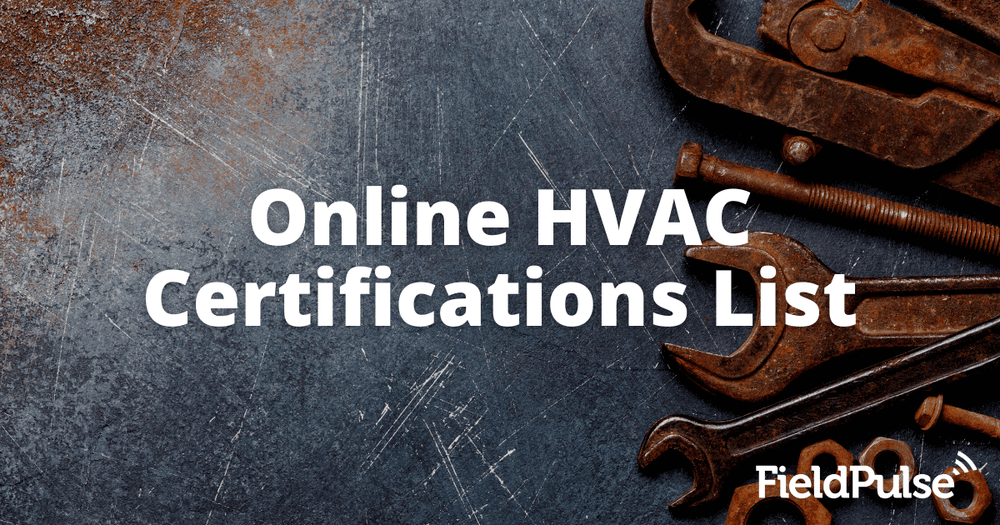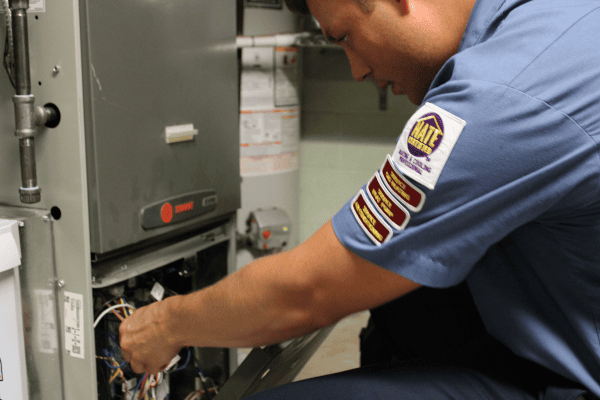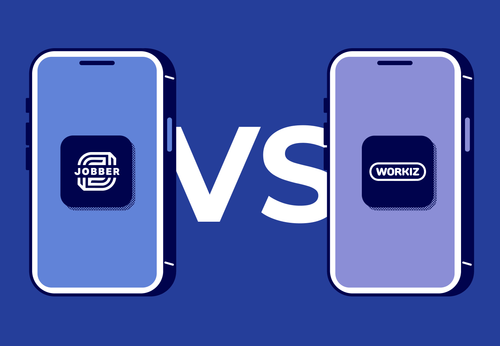Online HVAC Certifications List
Aug 16, 2024

Money spent on HVAC certification leads to higher pay, more credibility with customers, and better employment opportunities down the line. So, which certifications should you get? Fortunately, we've outlined our top suggestions in the online HVAC certifications list below!
Is HVAC Certification Worth It?

You're probably asking yourself: "Who needs online HVAC certifications when on-the-job experience will do?" But money spent on HVAC certification is money well invested in your career or business. It can lead to higher pay for technicians and more credibility for businesses, big and small. Don't think of it like high school or even community college; think of it as a way to take one core exam to build your career path - or even start a new career!
Plus, if your state HVAC license has continuing education requirements, pursuing certifications that you can display on your website for future customers can also be a great use of time. It boosts your customers' confidence while you're already taking board-approved courses long before you ever start the HVAC estimate process.
Offering HVAC certifications as a suggestion to your HVAC technicians can also help build their confidence and knowledge base, and it's free education as far as you, the employer, is concerned.
Keep in mind that you might have to take some certifications as part of your state licensing. For example, California requires an EPA (Environmental Protection Agency) certification. In that case, the list below will show you where to take the exam online!
What Certifications Do You Need For HVAC?
The certifications you'll need to operate in the HVAC sector, HVAC technician certifications, or HVAC business certifications in general, all depend on what specific state you're looking to get certified in. Each state has its own separate rules for state certification. The process can involve a comprehensive exam, a written test, an on-the-job HVAC program certification process, or a technician's completion.
Some companies pay their HVAC technicians more just for obtaining specific HVAC technician certifications, while other certifications are in the order necessary to complete the job. For example, some states require an EPA card or certification to purchase refrigerant. If you want to travel or relocate, you should obtain a NATE certification to relocate without any issues with your certification. Either way, look up the specific state certification for your state to see what you'll need to operate as a technician legally.
How To Get HVAC Certified Online
While there are HVAC schools worldwide, getting HVAC certified online is the easiest, fastest way to get through the certification process so you can start working immediately. The ACCA has a website where you can browse all possible certifications they offer and decide which ones are right for you. Some industry certifications are optional, some are mandatory, but all could help you in the long run - especially NATE certification - when it comes to getting your technician career path going.
Whether you're entry-level or simply want to take a test prep course, a field practice course, or any other of the many options they offer - some basic, some more experienced, and in-depth - you can always find what you're looking for online. Getting your HVAC technician certifications online will let you work or test your own pace, so you can finish as quickly as you're capable and get right back to work! HVAC professionals agree it's great to have additional resources at your disposal while getting a professional-level certification, whether Type II certification, master specialist level certification or beginner technician certifications.
How Much Does HVAC Certification Cost?
The price for HVAC certifications varies from $40 to $150 depending on the specific exams, websites, classes, and whether or not you're a member. However, there isn't one fixed price across all sectors.
There are different exams, certifications, and levels of training altogether. Some classes and certifications offered are for entry-level, while others are specific for long-time HVAC technicians who want a refresher on the basics. There are certifications for particular jobs, like duct repair and diagnostics, air conditioning, and other exams that focus solely on commercial business.
HVAC Certification Online Cost
When taking your HVAC certifications, it's best to check the prices for online exams, especially since they run year-round. You can do them at your own pace. Become a member of most of the websites, like the ACCA. You can get a discount on all of the exams and certifications you get while having them all accessible together in one place, helping to prepare students to take on as many certification exams as they'd like to become a technician.
HVAC Certifications List
A handful of key certifications technicians should consider pursuing in the HVAC industry, depending on who you want to work for and how much you can spend. We'll detail the complete list below, but at a glance, you'll want to consider the following certifications:
- State or Local Licensing
- HVAC Quality Installation Standard
- UA STAR HVACR Master Certification
- NITC
- EPA Certification (Section 608)
- R-410A
- HVAC Excellence Certification
- NATE Certification HVAC
- ASHRAE
- OSHA Safety Certificate
- Home Evaluation and Performance Improvement
- Carrier Factory Authorized Dealer
- Carrier Certified Healthy Air Systems
- Trane Comfort Specialist
- Mitsubishi Diamond Contractor: Certified Training and Expertise
- AEE Certifications
- NYC Clean Heat Program
HVAC Technician State or Local Licensing
It's important to remember that licensing for HVAC technician licensing is different for every single state. While there aren't a lot of trades that require you to hold more than one certification, HVAC is the exception to that rule. If you're caught operating without the proper licenses, there are serious repercussions - especially if you also have to answer a municipal board. Here's a list of HVAC license requirements by state that you'll need to operate legally as a technician.
What States Require HVAC License?
The following states require some sort of HVAC license or certification exams for technicians, although HVAC license requirements by state vary:
- Alabama
- Alaska
- Arizona
- Arkansas
- California
- Connecticut
- District of Columbia
- Delaware
- Florida
- Georgia
- Hawaii
- Idaho
- Iowa
- Kentucky
- Louisiana
- Maryland
- Massachusetts
- Michigan
- Mississippi
- Montana
- Nevada
- New Jersey
- New Mexico
- North Carolina
- North Dakota
- Ohio
- Oklahoma
- Oregon
- Pennsylvania
- Rhode Island
- South Carolina
- Tennessee
- Texas
- Utah
- Virginia
- Washington
- West Virginia
- Wisconsin
Additionally, you can check our detailed guide to HVAC license reciprocity by state for more information, like how to transfer licenses between states with the North American Technician Excellence certifications, renew licenses, and become a legally licensed technician in your area.
What States Do Not Require HVAC License?
The following states do not require state HVAC licenses for technicians to operate:
- Colorado
- Illinois
- Indiana
- Kansas
- Maine
- Minnesota
- Missouri
- Nebraska
- New Hampshire
- New York
- South Dakota
- Vermont
- Wyoming
HVAC Quality Installation Standard
The HVAC Quality Installation (QI) standard is the quality standard the ACCA (Air Conditioning Contractors of America) has provided that are universally accepted by residential air conditioning contractors and commercial contractors alike. The quality standards outline the procedures that a technician or contractor should follow when technicians are installing any HVAC equipment - air conditioning, heating, heat pumps, oil heating, and ventilation.
UA STAR HVACR Master Certification
Another exam, conducted by the National Inspection Testing and Certification Corporation (NITC) , requires five years of documented work experience (installing, maintaining or otherwise) or being in the fifth year of an HVACR training program, for a technician to be eligible.
Participants and technicians are expected to "demonstrate mastery of the trade and will be skilled and experienced in operations, planning, blueprint reading, safety, and the practical installation, repair, and service of HVAC systems," according to the NITC's website.
NITC Certification (NITC)
The National Inspection Testing Certification (NITC) website provides online testing for a variety of different licenses and certifications a certified HVAC technician could need. Even if you think you have enough work experience or the proper certifications, it's worth seeing if you can expand your current knowledge base or get a certification on things you are already well versed in so clients will know your worth. You can accelerate your career and get a leg up in your respective HVAC industry, rather than being the same level and experience as your technician competition.
EPA Section 608 Certification
If your HVAC business involves the "R" in HVACR – that is refrigerant work – you will need to get EPA certification.
Some free practice tests are available online if you want to gauge where your knowledge stands before committing to the official test. The certification itself is available for technicians from any testing agency like ESCO.
This certification refers to section 608 of the federal Clean Air Act. All "HVAC technicians who maintain, service, repair, or dispose of equipment that could release ozone-depleting refrigerants into the atmosphere."
Types of EPA certifications you may be interested in:
- Type 1 - Small Appliances (5lbs or less of refrigerant)
- Type 2 - For Medium, High, and Very-High Pressure Appliances
- Type 3 - Low-Pressure Appliances
- Universal - Someone who possesses Type I, Type II, and Type III Certifications
- Indoor Air Quality (IAQ) Certification
R-410A Certification
R-410A has a higher pressure and different behavior than other refrigerants, making specific training and R-410A certification a wise choice for anyone who wishes to work with it in any capacity. You can receive free study materials and take the test online for a fee of $24.95.
HVAC Excellence Certification(s)
Created by the Education Standards Corporation (ESCO) in 1994, HVAC Excellence actually comprised a number of program and certifications that can help get technicians on their feet.
For workers just starting, they offer Employment Ready Certifications , which demonstrate that budding HVAC technicians have attained the specific knowledge they need to perform on the job.
These are linked to specific disciplines, making it easy for students and entry-level HVAC techs to show their knowledge to potential employers.
In addition to these, HVAC techs can work towards Professional Level Technician certifications and a Master Specialist Certification.
Professional Level Certifications require two years of verified field experience, while Master Specialist certification requires three.
The Master Specialist Certification also requires passing the Professional Level test (or equivalent) and a hands-on test of experience.
These are great options that can give someone looking to become a technician or potential HVAC engineers starting a clear path to professional mastery – at least from a certification standpoint!
NATE (North American Technician Excellence) HVAC Certification
The North American Technician Excellence (NATE) group bills itself as the "gold standard" of HVAC technical certifications.
A NATE certification certainly has a well-deserved reputation, too, with certifications offered at over 5,000 testing organizations, so HVAC techs all over have the opportunity to advance their HVAC career.
NATE certification is offered in four separate exam certifications, from a "ready to work" certification similar to that of HVAC Excellence's to Core Specialty Exams and Senior Level Efficiency exams.
They come recommended for their long-standing reputation and specificity of their exam structure. This means you can hone in on the area where you want to be an expert.
ASHRAE (American Society of Heating, Refrigeration and Air-Conditioning Engineers) Certification
ASHRAE (American Society of Heating, Refrigeration and Air-Conditioning Engineers) is a worldwide organization that provides the standard for terminology and information related to HVAC heating, air conditioning and refrigeration professionals. They conduct rigorous, up-to-date designing, testing, and installing of hardware for HVAC technology. You can find specific information about gas heating, oil heat, electric heat, automated technology, and more.
Building Energy Assessment Professional Certification
The BEAP certification is a certification that helps validate your ability and competency to analyze and assess site conditions, building HVAC systems, equipment conditions and energy uses, and more. It can be taken online at your leisure and is acceptable for an entry-level or expert-level HVAC technician.
It's recognized by the U.S. Department of Energy (DOE) and is an ANSI-Accredited Personnel Certification Program under ISO/IEC 17024 (#1139).
Building Energy Modeling Professional Certification
The BEMP certification is a certification that helps validate your ability and competency in regards to new and existing building systems, specifically use of the energy modeling software in building and system energy performance. It highlights your ability to select, use, interpret, and appraise the energy modeling software results. It can be taken online at your leisure and is acceptable for an entry-level or expert-level HVAC technician.
It's recognized by the U.S. Department of Energy (DOE) and is an ANSI-Accredited Personnel Certification Program under ISO/IEC 17024 (#1139).
Certified HVAC Designer
The CHD certification is a certification that helps validate your ability to design HVAC systems that will meet the requirements for future projects and buildings, including the HVAC equipment involved, room design, layouts, duct and piping specifics, loading calculations, and more. You'll learn to develop the HVAC plans necessary to receive permits and do construction. It can be taken online at your leisure and is acceptable for an entry-level technician or expert level HVAC technician.
It's recognized by the U.S. Department of Energy (DOE) and is an ANSI-Accredited Personnel Certification Program under ISO/IEC 17024 (#1139).
OSHA Safety Certificate
OSHA trains employees and HVAC technicians both in the public and private sector for occupational safety to keep workers' health up while reducing incident rates. You can earn certifications online.
Home Evaluation and Performance Improvement
Home Evaluation and Performance Improvement is a nationally approved standard that identifies and establishes the absolute minimum criteria for assessing and improving deficiencies in existing homes. Their primary focus is promoting safe and healthy homes that meet industry standards of what is legally required while meeting improvement objectives, whether it's small appliances, air distribution, leak repair requirements, or more.
Dealer Certifications
Carrier Factory Authorized Dealer
While not technically a certification becoming a Carrier Factory Authorized Dealer offers extensive HVAC training to allow you to join an illustrious group of leaders and peers in the industry, held higher due to their rigorous standards and HVAC training program. HVAC excellence and in-depth knowledge are required for all industry experts looking to become authorized.
Trane Comfort Specialist
An HVAC technician that meets Trane's high standards can become authorized as Trane Comfort Specialists, showing that they are committed to the best installation, service, training, and customer service satisfaction that can be provided.
Mitsubishi Diamond Contractor
Mitsubishi Electric Diamond Contractor is one the highest certification you can possibly achieve in the HVAC industry, awarded after extensive training and instruction either online or at a Mitsubishi Electric approved training center.
It is accredited by the International Association for Continuing Education and Training (IACET) and is authorized to issue the IACET CEU.
AEE Certifications
AEE is a Nonprofit organization dedicated to serving technicians, members, and other industry professionals who are working to improve energy efficiency to save energy, reduce GHGs, make buildings perform better, and help reach global goals for Net-Zero. See which certifications are right for you.
NYC Clean Heat Program - only available in New York
If you participate in the NYS Clean Heat program, you can offer vast discounts and low-interest financing on heaters - whether they're ground-source (geothermal), air source or heat pumps water heaters - to your customers. View the manual for more information.
Field Service Software For HVAC Technicians
Although it may seem like there's too much information to keep track of in the world of HVAC maintenance, certifications, and more, FieldPulse has you covered.
You can use our HVAC business software to share and sign HVAC maintenance agreements, give immediate estimates to your customers or your HVAC technicians, create HVAC invoices on the go, and more!
You can even try FieldPulse to ensure it's the right fit for your business.



